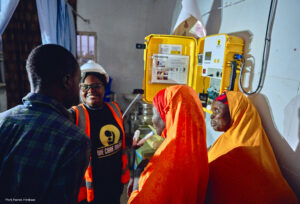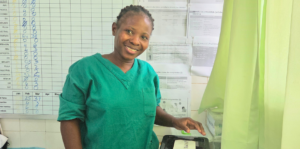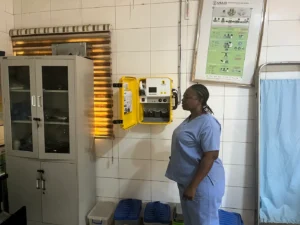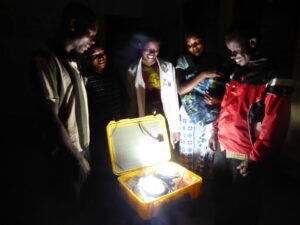There are things that we absolutely take for granted in American medicine. For example, it would not occur to us that a hospital would not have running water, electricity, or a telephone. We anticipate attentive front-line care from nursing staff, clean linen and towels from laundry workers, and something nourishing several times a day from the food service. We expect that hospital pharmacies provide medication, laboratories provide blood tests, radiology departments provide x-ray services and so forth. While our health care providers may have different levels of competency and compassion, we would anticipate having daily contact during our hospital stay. We might grapple with the quality or consistency of American medical care, but the basic items I just listed are not typically in question.
Release yourself from these assumptions.
Imagine instead that your hospital is as impoverished as your village community. That you cannot assume to find overhead illumination or a working bathroom. That your midwife can only wash her hands with water from a standing bucket. That the hospital pharmacy stores its entire inventory in one modest cabinet, and that most of the medication you need must be purchased by a family member outside the hospital before you can receive it. That there is no food, no sheets, and at times, no freedom. In fact, a padlock exists on the maternity ward to minimize disturbances from visitors.
If you are a woman, imagine what it might be like to have a baby under these conditions. Imagine it is nighttime and that you are having your first baby. Your family must first bang the locked metal door that separates labor and delivery from the outside world, hoping to get the attention of a nurse. If she comes to the door and decides you can be admitted, you will be brought into a pitch black room, and asked to climb onto a cold metal delivery table. The plastic lining below you was briefly wiped down after the last delivery. Your street clothes will be your only covering, and later these will become the rags used to clean the table or wrap your baby. There will be no attempts to learn about your medical history, your allergies, or certainly, any preferences or concerns you may have for your birth. There is no such thing as a birth plan. Your nurse will make the briefest of assessments and then initiate treatment, if one is obvious. If she decides you are having a normal labor, she will leave you alone in the dark. There are no monitors to make note of your contractions. If your nurse is able to find your baby’s heart beat with her rustic fetoscope, your baby will be left in its own private environment, free of external assessment. Whether your baby lives or dies will be a function of its own fortitude. Cesarean sections take so long to be enacted that it would be senseless to recommend surgery if your baby is in distress. If you are lucky, your nurse will look at you when she talks, and invite you to comply with her requests. If not, she will give little explanation for her action, and speak to others about your ignorance and illiteracy if you resist her demands.
There will be nothing available to ease your pain. There will be no human touch, or supportive words, or efforts to wipe your brow.
When it is time to deliver the baby, your legs will be separated on the hard metal table, and you will be told to push under the beam of a flashlight. You might have a female family member by your side, but she will remain silent. Your midwife will not wash you, or provide a soft clean surface for the new life you have created. You will try to respond to the shouting and confusion around you, as your midwife commands you to push, oblivious to the rhythm of your own contractions.
When your baby is born, he will be dangled by his feet. If he doesn’t cry, his back will be slapped repeatedly before he is placed on the end of the bed, close to the pool of blood that has collected and is running onto the floor. No one will tell you your baby’s sex, his condition, or offer congratulations for your efforts. If stitches are needed, it is unlikely that you will receive anesthetic. You won’t realize that the equipment used to care for you is no longer sterile, and that the pad placed inside your vagina after the birth is nothing more than a sanitary napkin. Your biggest job once the baby is born is to stop bleeding, because no one will be checking you regularly to assess this.
Your baby may be placed by your side, wrapped in your own colorful cloth, however there are no railings to prevent a fall. Alternatively, your nurse may place your baby on the one infant scale located in the room. This is the only piece of equipment of suitable size to hold your baby. The malfunctioning incubator in the corner is being used to dry rags. If your baby has trouble breathing, or needs expert attention, you won’t be told. There is no equipment to help your baby, anyway, and no one in the hospital is trained in neonatal resuscitation.
You may be tired and hungry, because it is customary to refrain from eating during labor. No one will offer you anything. You must soon gather your things and free up the delivery table for the next mother. In fact, you will be asked to leave the hospital within a couple of hours. Someone will help you off of the table and ask you to walk up a concrete ramp to the maternity ward. If you faint on the way, you may lie on the cold floor until you’re ready to try again. No one will check your heart rate or blood pressure, give you intravenous fluids, or check a blood count.
You may wonder who the strange white woman is in room. She has been watching from the corner, sometimes talking to your midwife. She comes to you and smiles at your baby. She touches your wrist looks at her watch. She turns to you and speaks in a language you can’t understand, motioning to her mouth and the bowl by your bed. You look at her with vacant eyes, and don’t understand why she then leaves without mention. But when she returns and pours water from a bottle into your bowl, you understand…and take your first drink.







